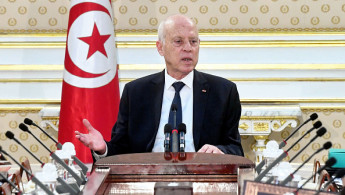Tunisia's Kais Saied blames water and power outages on 'criminal groups'
Once again, Tunisian President Kais Saied pointed a finger at unnamed "criminal organisations" as responsible for recent water and electricity outages across several cities across the North African country.
During a visit to dams on Tuesday, 23 July, President Saied described the outages as "unnatural, not innocent, and planned."
"These actions amount to a crime against the people and threaten national security," he warned, and then called for legal action against those responsible.
This isn't the first time Saied blamed "criminal groups" for the country's woes.
Since assuming extraordinary powers in 2021, he accused these unnamed groups of causing various issues, including the immigration crisis, food shortages, and opposition protests. He's even accused critical judiciary officials of being linked to "criminal gangs."
Despite not providing evidence for these claims, they have sometimes had serious consequences.
For example, last February, violence erupted against Black migrants in Tunisia after Saied alleged that sub-Saharan migrants were part of a criminal organisation aiming to change the country's demographic makeup. Amnesty International Rights Group described the situation at the time as a "vicious clampdown on migrants and refugees."
Tunisia's climate and political crisis
Despite Saied's claims, Tunisia is particularly vulnerable to changes in rainfall, relying heavily on surface water for its supply. Climate change has brought recurring droughts, scorching summers, low rainfall, and mild winters.
As a result, the country is facing a severe water crisis, with dam reserves down to 664 million cubic metres by mid-July—only 28.30% of their capacity.
Last March, Tunisia introduced a quota system for drinking water to manage the crisis, aiming to curb excessive consumption. The state water distribution company, Sonede, has also been cutting off supplies at night since last summer and started establishing seawater desalination plants to help alleviate pressure on northern dams.
The North African state has also introduced a ban on using drinking water for activities like washing cars, cleaning streets, or watering green areas, with penalties ranging from fines to imprisonment for up to six months for violators.
Over the last decade, Tunisia has grappled with a cash-strapped economy, severe drought, and an increasingly authoritarian regime.
The opposition argues that Saied has undermined the country's hopes for freedom and development since he dismissed the Ennahdha-supported government and suspended parliament, positioning himself as the ultimate interpreter of the constitution.
The president defends his actions as necessary to end governmental paralysis after years of political infighting and economic stagnation.
Tunisia is set to hold a one-man presidential election this September, with most of Saied's opponents either behind bars, facing trials, or disqualified.
"There is no competitive environment and no indications of free elections; instead, power is in the hands of one person," Wissam Saghir, spokesperson of the opposition party of Republican, told The New Arab.





 Follow the Middle East's top stories in English at The New Arab on Google News
Follow the Middle East's top stories in English at The New Arab on Google News


